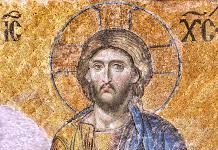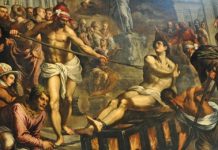
Someone will protest: “Why are you writing a piece on the atheist Christopher Hitchens? He’s dead, and isn’t he yesterday’s news?” But this is not altogether true. Hitchens is, I think, still very much alive in the hearts and minds of many atheists, and the proof of this is in how often you might hear, as I do in various debate forums, so many atheists chirping the favorite taunts of their late fallen hero.
So here goes.
Christopher Hitchens (1949-2011) was a British author and journalist educated at the University of Oxford. Early in his career he championed socialism. Later he came to his senses, then he moved on to become a greater champion of the New Atheism. Often confusedly identified by supporters and critics as liberal or conservative, he did not approve abortion but supported gun rights and same-sex marriage. Having dedicated himself to vigorously opposing the Viet Nam war, he infuriated fellow liberals by supporting the war in Iraq and Afghanistan. A year before he died, and following his apparently lifelong habit of amusing himself by startling others, Hitchens declared himself a Marxist.
At the rebellious age of fifteen, having already wearied of religion and the constrictions it imposed on his freedom to do as he pleased, Hitchens became an atheist. He soon enough discovered that he had an eloquent tongue and a booming voice that gave him advantage in the circles in which he moved, fending off bullies at school for example who seemed decidedly intimidated by that voice. It wasn’t long before he joined debating societies and distinguished himself at Oxford as an enfant terrible. As Larry Taunton points out in The Faith of Christopher Hitchens:
Christopher hated God and was determined that he should master and tyrannize him. To do so, however, he now needed the tools of warfare. In atheism he had found a principle that corresponded to his grievance. Now he had to weaponize it.
The Weapon ~ A Pen
Hitchens had a clever pen at his service that endeared him to many of his readers. The following simplistic epigram from god Is Not Great: How Religion Spoils Everything is typical of his writing style.
What can be asserted without evidence can also be dismissed without evidence.
Surely it would have been fascinating to hear Hitchens answer the following question: “Why do you assert God can be dismissed because there is no evidence that God exists?” Many arguments for God have been produced over the centuries. Some of the greatest scientists, including Newton, Darwin, and even Einstein, have been open to the idea of a creator and providential God at work in the universe. So now the challenge may be reversed: “How do you dismiss God without evidence there is no God?” Hitchens could not have answered such a question because there is not a scintilla of proof that God does not exists. By Hitchens’ own logic, if atheism can be asserted without evidence, it can be dismissed without evidence.
Here is another famous epigram challenge from Hitchens that he claimed none of the theists he debated had ever been able to answer:
Name one moral action performed by a believer that could not have been done by a nonbeliever.
Simply put, the nonbeliever cannot worship and give thanks to his Creator. If there is anything immoral in this world that all agree upon, it is that ingratitude is a vice.
Hitchens might protest that there is no God to thank, but he did not and could not know this for a fact. Facts are stubbornly true things you can prove, and, as stated above, you cannot prove there is no God, though you can stubbornly insist upon it. In short, atheism is an irrational and truly risky business.
Concerning the much vaunted claim by religion that it provides a sure basis for moral actions, Hitchens objected with yet another epigram:
How dare you claim we couldn’t find out own morality?
There are few statement sillier than this. Of course we can find our own morality if that is vainly what we insist upon. But finding one’s own morality is also a risky business and fraught with the likelihood of lazy and low I,Q. moral visions abounding from one person to the next. All humans are sinners, and liars to boot, We like to lie to ourselves and to each other. We can convince ourselves that what is bad is really good. For example, addiction to booze and cigarettes is suicidal and therefore bad, but we can convince ourselves it is good and not worth the effort of giving up.
Without the moral glue and surety supplied by religion (true religion, divinely revealed, not man-made), how is any one person supposed to know what another person’s moral vision should be? There needs to be the assumption of one transcendental vision binding us all together in cooperation and amity. Indeed, the so-called progressive movement of our time has resulted in too many special interest groups inventing moralities that tear asunder the fabric of simple fairness and common sense. Think of only one so-called moral demand that insanely shouts itself from the hilltop: the right of biological men to compete in women’s sports and invariably take home the gold.
Mocking Religion
When he was not busy mocking God, Hitchens was keen on scorning every established religion. His favorite target was the religion of Islam, which he pronounced the most “obscene, depraved, and toxic” religion on earth. He surely knew he could endear himself with his secularist and atheist followers, and as well perhaps with many Christians, by raking Muslim morality over the coals. When the Muslim piloted airplane attacks on New York City and Washington, D.C. happened on 9/11, he championed wrecking the Muslim nation of Iraq. That would be consistent with his view that the world would be better off if religious morality could be quashed everywhere. Were he alive today, Hitchens’ eloquent pen might race to approve the recent wounds inflicted by Israel and the United States upon the theocratic fascism of Iran’s Ayatollah Khamenei.
One might suppose that if Hitchens could not find anything good to say about Christianity, given his views on Islam he might at least have found something praiseworthy to say about Catholic Europe’s successful repulsion of Muslim military invasions during the Middle Ages. By the 12th century, following the crusades, universities in Europe were founded by Catholic donors. The University of Oxford, where Hitchens was educated, might never have come to exist if not for the Crusades that prevented all of Catholic Europe from being quashed under the thumb of the “toxic” religion Hitchens truly hated. It is doubtful that Hitchens ever acknowledged anywhere the credit due to Catholics and the Catholic Church for saving Western Civilization.
Hitchens’ Failings
Hitchens exercised a breezy dismissal of God and religion and also a dogged flight of fancy to prove that he was not alone in doing so. What better allies could he boast of to his American audience than the patriots Thomas Jefferson and Thomas Paine, whom Hitchens represented as allies. Now Jefferson, Paine, and Hitchens may all have quarreled with the veracity of the Bible and the Catholic Church, but Jefferson had defended the existence of God with a rather forceful argument, and Paine had written a pamphlet titled Atheism Refuted. Such stench of intellectual dishonesty hangs over much of Hitchens’ writing; either dishonesty or downright ignorance. As Taunton remarks in his book, Hitchens had a great deal of breadth (he was fairly well read) but he was decidedly short on depth, a defect of atheists that Voltaire himself had noted.
A greater failing of Hitchens was the need to be recognized and loved by fellow atheists as the undisputed king of the New Atheism movement. god Is not Great, How Religion Spoils Everything no doubt was written to that end. With so blasphemous a title (and making sure the insult is all it can be by spelling God with a lower case g), this book was sure to make money and secure debate performances ad aeternam. So it did. It also raised the stakes that his own soul was in jeopardy. What if Pascal’s wager argument for believing in God was right and he, Hitchens, was wrong? Within three years of publishing his most famous rant against God and religion, Hitchens was diagnosed with esophageal cancer. Like the actor Humphrey Bogart who died at age 57 from booze and cigarettes, Hitchens would die too soon to write a final book: God Is Great, How Booze and Cigarettes Spoil Everything.
Was Hitchens too proud and obstinate to change his mind before the end came? Larry Taunton, an evangelical Christian who had debated Hitchens and became his loyal friend a year before his death, had many private conversations with him that yielded surprising results. Most surprising of them all might have been that Hitchens clearly began to like evangelical Christians more than liberal elitists.
But Hitchens, according to all accounts, did not succumb to a deathbed conversion. It is possible that, as Pascal said, atheists hate religion but fear that it is true. If Hitchens had such a fear, he kept it to himself right to the end. Nothing could make us more certain of this than his remark that if reports were made that he had defected to the Enemy on his deathbed, people should know that the cancer had gone into his brain and he was not responsible for anything he did or said.
But as the hour of doom approached him, no one can know what Hitchens experienced in the innermost recess of his soul. With a generous portion of soul-food grace bestowed upon him by the last agonies of his disease, Hitchens may have been humbled enough to yield. While his followers will wildly deny it possible, he may have finally decided that God need not be the Enemy to be annihilated, but a Friend to be embraced.
And why not?
Deo Gratias!











